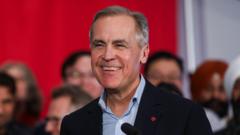The latest tariffs imposed by President Trump on Mexican goods mark the beginning of a potentially extensive trade conflict. Global leaders, especially from Canada and Europe, reflect on how to react, signaling possible countermeasures amidst diverging economic strategies.**
The Global Reaction to Trump's New Tariffs: A Define Moment in Trade Relations**

The Global Reaction to Trump's New Tariffs: A Define Moment in Trade Relations**
As President Trump's administration imposes new tariffs, the world watches how countries will respond and adapt to the shifting trade landscape.**
In a bold move, President Trump has introduced a 25% tariff on Mexican goods entering the US, signaling that the previous trade norms are under threat. This action is just the start of a wider strategy, as the administration prepares to extend similar tariffs to Europe and consider lower tariffs universally. The global trading community is now at a pivotal crossroad, assessing how the international stage will respond to these unilateral moves.
Importantly, the response from other countries will shape the future of the global trading system. Observers are trying to decipher Trump's varied justifications for imposing tariffs — whether they are aimed at enforcing specific diplomatic changes, correcting trade imbalances, or generating significant revenue for the US. However, the conflicting nature of these goals raises questions about their overall feasibility.
For instance, reflecting on the motivations behind the tariffs, it appears that Trump’s administration may be leveraging the fentanyl trade as a legal cover for their actions, despite serious skepticism among international leaders. Canadian Prime Ministerial candidate Mark Carney has strongly criticized the rationale behind the tariffs and has warned that Canada will retaliate “dollar for dollar.” This bold declaration emphasizes a growing sentiment that strong responses are warranted against perceived bullying tactics.
Additionally, Europe is currently positioned between the need for cooperation and the obligation of standing in solidarity against potential US aggressiveness. European diplomats are quietly exploring strategies to increase their purchases of American goods, perhaps in an effort to afford the US administration a semblance of a victory in these tumultuous negotiations.
Interestingly, the dynamics also extend towards retaliatory measures targeting prominent figures in Trump’s circle, including high-profile business people like Elon Musk. This could reflect an emerging trend where countries collaborate on coordinated tariff strategies in response to the unpredictable landscape created by the US.
As these developments unfold, it raises critical questions regarding the overall perception of US power in the global arena. Countries may start realizing there are alternatives to dealing solely with the US, leading to possible shifts in international alliances and trade agreements. The world finds itself in unprecedented territory, grappling with daily tariff threats and the broader implications on global trade as nations brace themselves for the potential fallout.
Importantly, the response from other countries will shape the future of the global trading system. Observers are trying to decipher Trump's varied justifications for imposing tariffs — whether they are aimed at enforcing specific diplomatic changes, correcting trade imbalances, or generating significant revenue for the US. However, the conflicting nature of these goals raises questions about their overall feasibility.
For instance, reflecting on the motivations behind the tariffs, it appears that Trump’s administration may be leveraging the fentanyl trade as a legal cover for their actions, despite serious skepticism among international leaders. Canadian Prime Ministerial candidate Mark Carney has strongly criticized the rationale behind the tariffs and has warned that Canada will retaliate “dollar for dollar.” This bold declaration emphasizes a growing sentiment that strong responses are warranted against perceived bullying tactics.
Additionally, Europe is currently positioned between the need for cooperation and the obligation of standing in solidarity against potential US aggressiveness. European diplomats are quietly exploring strategies to increase their purchases of American goods, perhaps in an effort to afford the US administration a semblance of a victory in these tumultuous negotiations.
Interestingly, the dynamics also extend towards retaliatory measures targeting prominent figures in Trump’s circle, including high-profile business people like Elon Musk. This could reflect an emerging trend where countries collaborate on coordinated tariff strategies in response to the unpredictable landscape created by the US.
As these developments unfold, it raises critical questions regarding the overall perception of US power in the global arena. Countries may start realizing there are alternatives to dealing solely with the US, leading to possible shifts in international alliances and trade agreements. The world finds itself in unprecedented territory, grappling with daily tariff threats and the broader implications on global trade as nations brace themselves for the potential fallout.























